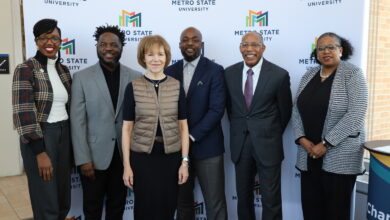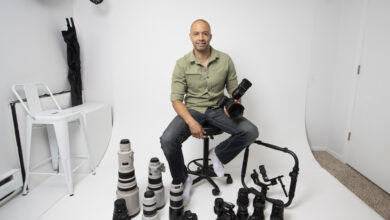How Mshale become Minnesota’s longest-running African newspaper. (Hint: print!)

When Tom Gitaa left his hometown of Mombasa, Kenya, in 1990 to pursue a college education in Minnesota, he had no intentions of going into journalism. Gitaa planned to earn a business degree and maybe a master’s before returning home.
Life did not follow that trajectory.
For the past quarter century, Gitaa, 52, has stuck it out in the Twin Cities, laboring in the ever-shifting sands of community journalism as founder, president, and publisher of Mshale, a newspaper for and about African immigrants in Minnesota. This, despite getting that business degree at Metropolitan State University in St. Paul. (He didn’t pursue a master’s.)
Gitaa had a chance to stick around the United States after graduation when he was unexpectedly granted a diversity visa, paving the way for permanent residence status and, ultimately, citizenship.
In the ’90s, there were a lot of reforms happening in Africa. People were trying to get rid of dictatorships and multiparty democracy was taking hold. Everybody was hungry for the news from back home.
tom gitaa
His plunge into the news business came at a time when African immigrants had few means to access information about the latest happenings in their home countries.
“In the ’90s, there were a lot of reforms happening in Africa,” Gitaa said. “People were trying to get rid of dictatorships and multiparty democracy was taking hold. Everybody was hungry for the news from back home.”
With the internet still in its infancy, that hunger could only be sated by the scattershot reportage available in western media, which tended to cover big events while neglecting daily affairs.
In 1996, Gitaa began compiling news from East Africa into a two-page summary he called Mshale (pronounced um-shall-LAY), the Swahili word for arrow, symbolizing “the hunt for the truth.” He distributed the fledgling publication by mail to a handful of friends and acquaintances.
“I would spend the weekend putting the digest together. Then I would go to a Kinko’s in Roseville on Monday and print two-pages on 11-by-17 paper,” said Gitaa. “I got compensated to cover the printing and mailing. But it was just a break-even thing. I considered it a community service.”
Mshale remained a side gig for about a decade. Gitaa worked a day job at a call center for a car rental business before landing in the marketing department of Best Buy.
All the while, Mshale’s circulation grew. Gitaa hired a stringer in Kenya to gather news and the paper soon increased to eight pages. Eventually, Gitaa concluded that it was too expensive and time-consuming to have Kinko’s print 1,500 copies of this heftier version of Mshale every week.
In 2001, he professionalized the operation, contracting with ECM Publishers in Coon Rapids to print Mshale on standard newsprint. He moved to a monthly publication schedule and began to give away the paper for free, with drop off spots in the African markets in St. Paul, Minneapolis, and Brooklyn Park.
With the shift away from paid subscriptions, Gitaa began to rely on advertisements for revenue. “It was a bit scary,” Gitaa said. “But surprisingly, we got more readers and more advertisers.”
Mshale’s editorial focus also shifted, with greater emphasis on what was happening in the African community in Minnesota rather than what was happening overseas. That was mainly a consequence of technology. As faster internet connections became ubiquitous, Gitaa said, news outlets in Africa were suddenly accessible to people in Minnesota, which made Mshale’s summaries of news from the continent “a little bit redundant.”
I ended up being a widower at a very young age, with two children. People were saying, ‘Hey Tom, you need to go back to corporate America…’ I thought, ‘This was my destiny, and I’ll tough it out.’
tom Gitaa
In 2005, Gitaa took the leap and became a full-time newspaper publisher. Just a few months after he left Best Buy and gave up his good health insurance, his wife was diagnosed with lung cancer.
“She went to Mayo, went through chemo. But they caught it too late,” Gitaa said. “All the time I thought, ‘This can’t be happening.’ ”
Between medical debts for his wife’s treatment and an expensive investment in Mshale’s website, Gitaa said he was teetering on the edge of bankruptcy.
“I ended up being a widower at a very young age, with two children,” Gitaa said. “People were saying, ‘Hey Tom, you need to go back to corporate America. How are you going to take care of children?’ I said, ‘You guys leave me alone.’ I didn’t follow their advice. I thought, ‘This was my destiny, and I’ll tough it out.’ ”
“Things worked out better than I expected,” Gitaa added. The paper survived and after 10 years, he remarried.
Mshale has been battered by the economic upheavals the internet has inflicted on news organizations large and small in the past decade. But COVID, he told Sahan Journal, has been good for Mshale, which shifted back to publishing weekly during the pandemic. That is thanks, in part, to advertising contracts with the Minnesota Department of Health, which relies on Mshale to educate Minnesota’s African community about COVID.
“I think we will print weekly until the end of this year. It’s not a crazy run—usually five or six thousand copies for free distribution,” Gitaa said. “We also still have 2,000 mail subscriptions.”
Gitaa shared a few of the lessons he’s learned in his 25 years in the news business. The following conversation has been edited for length and clarity.
If print is dying, why not shift to a strictly online model? “As far as print is concerned, if there is a demand, we will make it available. We have a huge group of older people who just like reading the newspaper.
“They want the print—anything to do with COVID, they want in print. When the internet came on so strongly, I ended up over-investing in Mshale.com. It is very challenging to sell ads online, especially for outlets like ours, which has a niche market. We have two full-time employees and a few freelancers. I don’t see how I can pay for that with only online advertisers.”
But remember that you still need an online presence: “We are very heavily digital. Most people who know Mshale know Mshale digitally. Younger readers aren’t interested in print. The only time they are interested in print is if they are on the cover of the paper.”
Nonprofit news (like Sahan Journal) are a growing sector in journalism. Ever consider that model? “It has crossed our minds, to be honest with you. One thing that worries me about it: As a for-profit company, we have more liberties.
“For instance, if one day, we have crazy people who come to our community and they are out to destroy the community by running for office, we have the liberty to say, ‘This is a crazy person. Do not vote for this person.’”
Want to be an entrepreneur? Know your customers: “The most important thing is you need to know your readers. And you have to know what the problem is that you are trying to solve.”
Don’t pay too much attention to the bankers: “If we all followed bankers’ advice, a lot of things we have today would not exist.”
























































